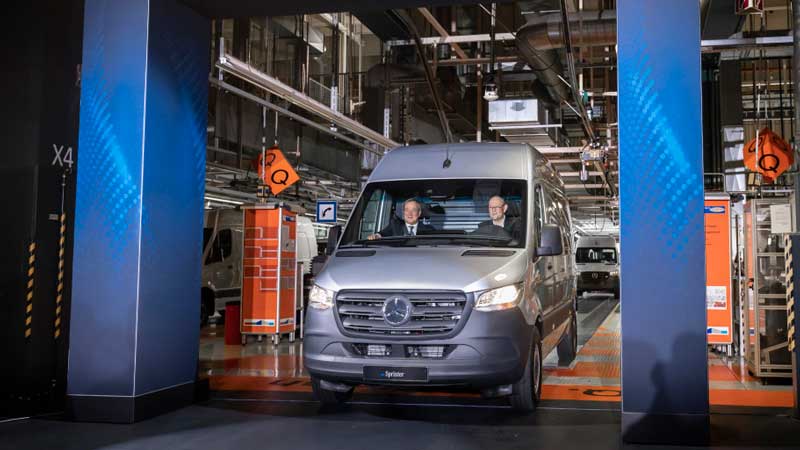
Mercedes-Benz commences electric Sprinter van production
German automaker Mercedes-Benz celebrated the start of production of a fully electric version of its popular Sprinter van at its factory in Dusseldorf, Germany.
At an event held on Thursday at the redeveloped factory, which has been building Sprinter vans since 1962, head of Mercedes-Benz Vans Marcus Breitschwerdt called the inclusion of the eSprinter into the Dusseldorf assembly line a “milestone”.
The culmination fo a 330 million euro ($A534 million) investment in the development of the 2020 Sprinter and its new drivetrains variants, the Dusseldorf plant is now the carmaker’s centre of competence for electrification with more than 2,400 staff trained in high voltage drivetrains so far.
Breitschwerdt says that the new electric drivetrains – which will power two new product lineups within the next two years – will become a mainstay of the urban and commercial sector and an essential shift for Mercedes-Benz Vans.
“The changeover of our products and production is essential for us as vehicle manufacturers. To implement this measure, we are building up our plants and investing – even in economically challenging times – to create the basis for our further economical success,” Breitschwerdt said.
The start of eSprinter production also has symbolic significance: it is part of a larger shift within the Dusseldorf plant to make all van production at the facility carbon neutral by 2022, with measures including use of hydrogen fuel cell automated vehicles in the factory, and a commitment to source 100% renewable energy.
According to Ingo Ettischer, head of Mercedes-Benz Vans Operations, it also underlines Mercedes-Benz’ commitment to Dusseldorf, which has to date produced more than 4 million vans and employs 6,600 staff.
“The electric drive is a key technology for the mobility of the future, and today we are already prepared to bring this technology to the road. Dusseldorf is of central importance for our production, and consequently we quite deliberately started production of the new eSprinter here,” said Ettischer at the event (as shared in a release to the press).
“For integration of the eSprinter production we have extensively upgraded the plant. Altogether, we have carried out the modifications within one year and invested several million euros – a clear indication of our commitment to the site.”
With a 55kWh quad-pack battery and about 168km range, the eSprinter delivers the same 85kW power output and 300Nm maximum torque as its entry-level diesel equivalent and offer up to 900kg payload capacity.
There is also a second tri-pack battery option that offers more than a tonne (1040kg) payload capacity, however it has a shorter range of 115km.
Fast charging capabilities are included with the ability to recharge to 80% in 30 minutes, and top speeds can be configured at either 80km/hr, 100km/hr or 120km/hr.
The eSprinter will initially be offered with a high roof, maxmimum gross weight of 3.5 tonnes and maximum voume of 10.5m3.
To determine if the eSprinter – or Mercedes-Benz Vans other electric offering, the eVito – is suitable for customers, Mercedes-Benz has provided an app called eVan Ready that can be used to record routes and payloads and give feedback on which routes would be feasible in either vehicle.

